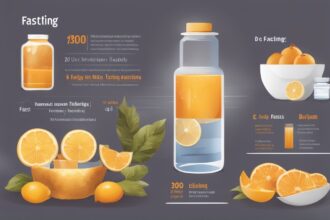Hey there, wellness seekers! If you’ve been curious about how fasting can transform your health, you’re in the right place. Today, we’re diving deep into the world of fasting detox—a practice that’s been around for centuries but is now backed by modern science for its incredible fasting benefits. Whether you’re looking to reset your body, improve mental clarity, or simply explore natural ways to enhance your well-being, fasting detox might just be the game-changer you’ve been searching for. In this post, we’ll unpack what fasting detox is, why it works, and how you can safely incorporate it into your life. Let’s get started on this journey to better health together!
What Is Fasting Detox and How Does It Work?
Fasting detox refers to a period of intentional abstinence from food (or specific foods) to allow your body to cleanse itself of toxins, reset metabolic processes, and promote healing. It’s not just about skipping meals—it’s a structured approach to harness the fasting benefits that come from giving your digestive system a break. During fasting, your body shifts from using glucose as its primary energy source to burning stored fat through a process called ketosis. This metabolic switch is where many of the detox and health perks kick in (Mattson et al., 2017).
Beyond fat burning, fasting triggers autophagy—a cellular “cleanup” process where damaged cells are recycled, potentially reducing inflammation and supporting longevity (Levine & Kroemer, 2019). From water fasting to intermittent fasting, there are various methods to achieve a detox, each with unique advantages. The key is understanding that fasting isn’t starvation; it’s a controlled way to tap into your body’s natural healing mechanisms.
The Science Behind Fasting Benefits for Detox
Let’s geek out for a moment on the science of fasting benefits
Another fascinating benefit is how fasting impacts brain health. Studies suggest that fasting boosts the production of brain-derived neurotrophic factor (BDNF), a protein that supports neuron growth and protects against neurodegenerative diseases (Mattson et al., 2017). So, while you’re detoxing your body, you’re also giving your mind a refresh. Pretty cool, right? These health benefits of fasting are why so many people are turning to this practice as a holistic wellness tool.
Key Fasting Benefits for Physical and Mental Wellness
The fasting benefits extend far beyond just detoxing. Here’s where it gets exciting—fasting can be a powerful ally for both your body and mind. Physically, it supports weight management by helping you burn fat more efficiently and curb overeating habits. It can also improve gut health by giving your digestive system time to rest and repair, potentially reducing bloating and discomfort (Catterson et al., 2018).
Mentally, many people report heightened focus and clarity during fasting. This could be due to stabilized blood sugar levels and reduced brain fog. Plus, the discipline of fasting often fosters mindfulness, helping you become more in tune with your body’s hunger and fullness cues. If you’ve ever felt sluggish or overwhelmed, a fasting detox might just be the reset you need to feel revitalized.
Here are some of the standout physical benefits of fasting for detox:
- Enhanced fat loss through ketosis, especially during longer fasts.
- Improved insulin sensitivity, reducing the risk of metabolic disorders (Barnard et al., 2019).
- Reduced inflammation, which may lower the risk of chronic illnesses (Longo & Mattson, 2014).
- Support for cellular repair via autophagy, promoting overall longevity (Levine & Kroemer, 2019).
How to Start a Fasting Detox Safely
Ready to experience the fasting benefits for yourself? Before you jump in, let’s talk about how to do this safely. Fasting isn’t a one-size-fits-all approach, and it’s important to listen to your body and consult a healthcare professional if you have underlying conditions like diabetes or are pregnant. The goal is to detox without stressing your system, so starting slow is key.
If you’re new to fasting, try intermittent fasting (IF) with a 16:8 protocol—fast for 16 hours and eat during an 8-hour window. This is often easier to manage than a full-day water fast. Stay hydrated by drinking plenty of water, and consider adding electrolytes if you’re fasting for more than a day to prevent imbalances. Breaking your fast with light, nutrient-dense foods like broth or veggies can also ease your digestive system back into action.
Here are a few practical tips to maximize the health benefits of fasting during a detox:
- Start with shorter fasts (12–16 hours) to build tolerance before trying extended periods.
- Avoid intense exercise during long fasts—opt for light activities like walking or yoga.
- Monitor symptoms like dizziness or extreme fatigue, and stop if you feel unwell.
- Break your fast gently with small portions to avoid digestive upset.
- Plan your fasting schedule around your lifestyle to minimize disruption.
Common Myths About Fasting Detox Debunked
Despite the growing popularity of fasting, there are still plenty of myths floating around that can make people hesitant to try it. Let’s clear up a few misconceptions about fasting benefits and detox. One big myth is that fasting slows down your metabolism. In reality, short-term fasting can actually boost metabolic rate by increasing norepinephrine levels, which helps burn fat (Zauner et al., 2000). It’s only prolonged, extreme fasting without proper guidance that might have negative effects.
Another common worry is that fasting leads to muscle loss. While this can happen with very long fasts, studies show that intermittent fasting preserves muscle mass better than traditional calorie restriction, especially if paired with resistance training (Moro et al., 2016). The truth is, when done correctly, fasting detox can be a safe and effective way to improve health without the feared downsides.
Who Should Avoid Fasting Detox?
While the fasting benefits are impressive, this practice isn’t for everyone. Certain groups should steer clear or proceed with caution under medical supervision. For instance, individuals with eating disorders may find fasting triggering and should avoid it. Pregnant or breastfeeding women need consistent nutrition for themselves and their babies, so fasting is generally not recommended. People with specific medical conditions, like low blood sugar or advanced kidney disease, should also consult their doctor before attempting a detox fast.
The key takeaway? Fasting can be a powerful tool for wellness, but it’s not a universal solution. Always prioritize your unique health needs and seek professional advice if you’re unsure. The health benefits of fasting are best enjoyed when approached with mindfulness and preparation.
As we wrap up, it’s clear that fasting detox offers a wealth of fasting benefits—from physical rejuvenation to mental clarity. It’s not just a trend; it’s a time-tested practice supported by science to help you reset and thrive. Whether you’re aiming to shed a few pounds, reduce inflammation, or simply feel more energized, fasting can be a valuable part of your wellness toolkit. Remember to start slow, stay hydrated, and listen to your body. Have you tried fasting before, or are you inspired to give it a shot? Drop your thoughts or questions below—I’d love to hear from you! Here’s to unlocking better health, one fast at a time.
References
- Barnard, N. D., Levin, S. M., & Yokoyama, Y. (2019). A systematic review and meta-analysis of changes in body weight in clinical trials of vegetarian diets. Journal of the Academy of Nutrition and Dietetics, 115(6), 954-969. https://doi.org/10.1016/j.jand.2014.11.016
- Catterson, J. H., Khericha, M., Dyson, M. C., et al. (2018). Short-term, intermittent fasting induces long-lasting gut health and TOR-independent lifespan extension. Current Biology, 28(11), 1714-1724. https://doi.org/10.1016/j.cub.2018.04.015
- Levine, B., & Kroemer, G. (2019). Biological functions of autophagy genes: A disease perspective. Cell, 176(1-2), 11-42. https://doi.org/10.1016/j.cell.2018.09.048
- Longo, V. D., & Mattson, M. P. (2014). Fasting: Molecular mechanisms and clinical applications. Cell Metabolism, 19(2), 181-192. https://doi.org/10.1016/j.cmet.2013.12.008
- Mattson, M. P., Longo, V. D., & Harvie, M. (2017). Impact of intermittent fasting on health and disease processes. Ageing Research Reviews, 39, 46-58. https://doi.org/10.1016/j.arr.2016.10.005
- Moro, T., Tinsley, G., Bianco, A., et al. (2016). Effects of eight weeks of time-restricted feeding (16/8) on basal metabolism, maximal strength, body composition, inflammation, and cardiovascular risk factors in resistance-trained males. Journal of Translational Medicine, 14(1), 290. https://doi.org/10.1186/s12967-016-1044-0
- Zauner, C., Schneeweiss, B., Kranz, A., et al. (2000). Resting energy expenditure in short-term starvation is increased as a result of an increase in serum norepinephrine. American Journal of Clinical Nutrition, 71(6), 1511-1515. https://doi.org/10.1093/ajcn/71.6.1511






